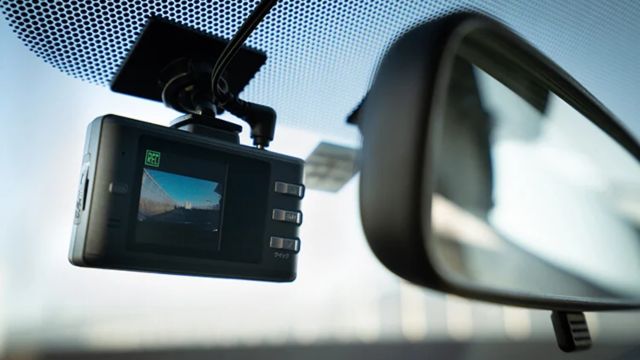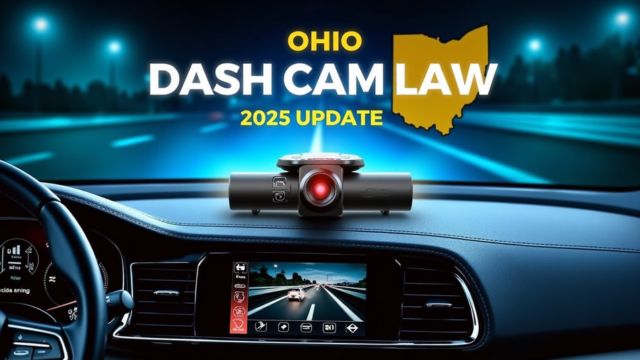In Georgia, dash cameras are allowed, but there are some regulations that must be followed in order to ensure that road safety is maintained and that privacy rights are protected. The following is a complete summary of dash cam laws in Georgia:
Setting Up and Positioning
Dash cameras are permitted by Georgia law, however there are specific regulations about where they can be placed. According to Georgia Code § 40-8-73, “No person shall drive any motor vehicle with any sign, poster, or other non-transparent material upon the front windshield, side windows, or rear windows of such vehicle which obstructs the driver’s clear view of the highway or any intersecting highway.” This indicates that:
To be in accordance with the legislation, dash cams should be put on the dashboard wherever possible.
If they are attached to the windshield, they must not block the driver’s ability to see the road clearly.
The installation should guarantee that the device does not disrupt the vehicle’s operation or put safety at risk.
Recording of Video and Audio
Video Recording:
In general, it is acceptable to record videos in public places, such as roads and highways, without the consent of the people concerned, because there is no expectation of privacy in these areas.
Audio Recording:
When it comes to audio recording, Georgia is a “one-party consent” state.
At least one person involved in the conversation must be aware of and agree to the recording if the dash cam captures audio inside the vehicle.
It is recommended that passengers be made aware when audio recording is in progress. This can be done by putting up a sign or sticker in the vehicle.
The Footage’s Legal Acceptability
In Georgia, dash cam footage can be used as evidence in court, but only if specific circumstances are met:
- Relevance: The video must be pertinent to the current case.
- Probative Value: Its probative value must be greater than any adverse influence.
- Authentication: The person who is presenting the video must prove that it is a genuine and accurate representation of the events that it shows.
- Integrity: The footage must be unaltered, unedited, and untampered with.
As stated in O.C.G.A. Section 24-4-408, “Photographs, motion pictures, videos, and audio recordings of conduct and statements shall be admissible if relevant to any material fact or issue.”
Utilization in Legal Proceedings
- In disputes about personal injury or property damage that occur after a vehicle accident, dash cam film can be extremely important.
- It can be used to bolster a claimant’s case or by other parties to dispute the claimant’s version of events.
- Dash cam footage is typically accepted as proof in claims by insurance carriers.
Things to Think About Regarding Privacy
Although it is typically permissible to record video in public settings, it is crucial to be aware of privacy rules, particularly when it comes to capturing audio. When you are recording audio conversations inside your vehicle, make sure that you have the proper consent at all times.
Recommended Procedures
- Make sure that your dash cam is installed correctly and does not block your view of the road.
- Make sure to check your gadget on a regular basis to ensure that it is working properly and collecting quality footage.
- Keep in mind that if you have a dash cam, you may be required to provide film as evidence, even if it does not support your case.
- In order to comply with consent rules, passengers must be informed about audio recording.
Georgia drivers can legally and successfully use dash cameras to defend their interests and contribute to road safety by learning and obeying these restrictions.
In Georgia, dash cameras are allowed, but there are some regulations that must be followed in order to ensure that road safety is maintained and that privacy rights are protected. The following is a complete summary of dash cam laws in Georgia:
Setting Up and Positioning
Dash cameras are permitted by Georgia law, however there are specific regulations about where they can be placed. According to Georgia Code § 40-8-73, “No person shall drive any motor vehicle with any sign, poster, or other non-transparent material upon the front windshield, side windows, or rear windows of such vehicle which obstructs the driver’s clear view of the highway or any intersecting highway.” This indicates that:
To be in accordance with the legislation, dash cams should be put on the dashboard wherever possible.
If they are attached to the windshield, they must not block the driver’s ability to see the road clearly.
The installation should guarantee that the device does not disrupt the vehicle’s operation or put safety at risk.
Recording of Video and Audio
Video Recording:
In general, it is acceptable to record videos in public places, such as roads and highways, without the consent of the people concerned, because there is no expectation of privacy in these areas.
Audio Recording:
When it comes to audio recording, Georgia is a “one-party consent” state.
At least one person involved in the conversation must be aware of and agree to the recording if the dash cam captures audio inside the vehicle.
It is recommended that passengers be made aware when audio recording is in progress. This can be done by putting up a sign or sticker in the vehicle.
The Footage’s Legal Acceptability
In Georgia, dash cam footage can be used as evidence in court, but only if specific circumstances are met:
- Relevance: The video must be pertinent to the current case.
- Probative Value: Its probative value must be greater than any adverse influence.
- Authentication: The person who is presenting the video must prove that it is a genuine and accurate representation of the events that it shows.
- Integrity: The footage must be unaltered, unedited, and untampered with.
As stated in O.C.G.A. Section 24-4-408, “Photographs, motion pictures, videos, and audio recordings of conduct and statements shall be admissible if relevant to any material fact or issue.”
Utilization in Legal Proceedings
- In disputes about personal injury or property damage that occur after a vehicle accident, dash cam film can be extremely important.
- It can be used to bolster a claimant’s case or by other parties to dispute the claimant’s version of events.
- Dash cam footage is typically accepted as proof in claims by insurance carriers.
Things to Think About Regarding Privacy
Although it is typically permissible to record video in public settings, it is crucial to be aware of privacy rules, particularly when it comes to capturing audio. When you are recording audio conversations inside your vehicle, make sure that you have the proper consent at all times.
Recommended Procedures
- Make sure that your dash cam is installed correctly and does not block your view of the road.
- Make sure to check your gadget on a regular basis to ensure that it is working properly and collecting quality footage.
- Keep in mind that if you have a dash cam, you may be required to provide film as evidence, even if it does not support your case.
- In order to comply with consent rules, passengers must be informed about audio recording.
Georgia drivers can legally and successfully use dash cameras to defend their interests and contribute to road safety by learning and obeying these restrictions.







Leave a Comment